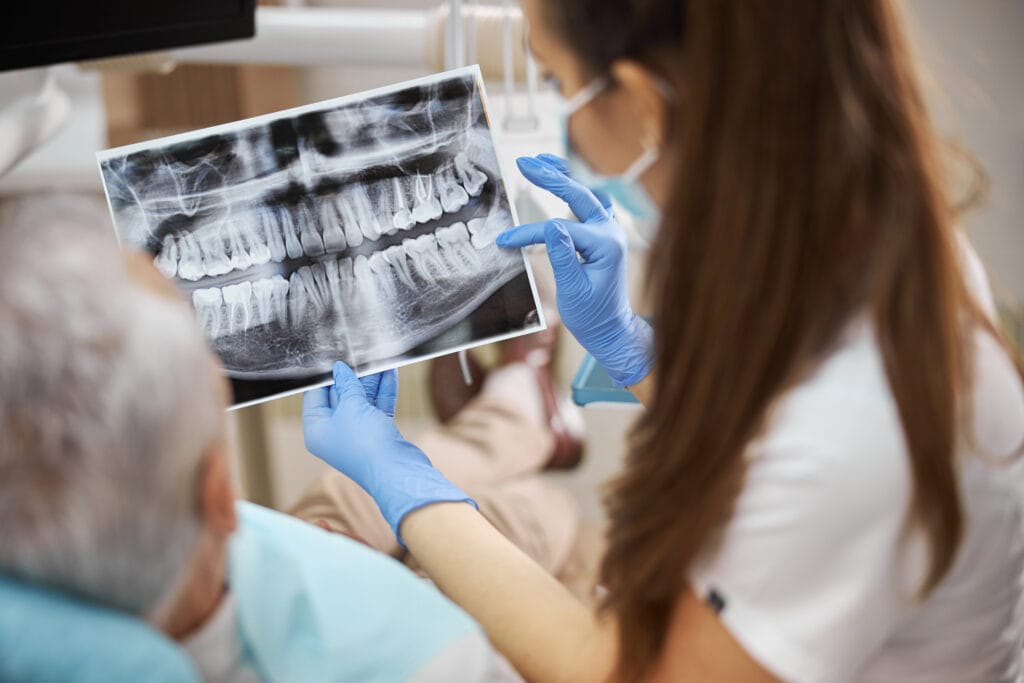
Do you ever wonder why your dentist asks you to get X-rays done? It may seem like a hassle, but there’s a fundamental reason behind it. Here’s what you need to know about why X-rays are so crucial at the dentist.
X-rays are a vital tool that dentists use to get a comprehensive look at your oral health. They can help to detect any problems that may be present, even if they’re not visible to the naked eye. This is especially important in cavities, which can often be hidden between teeth or in other hard-to-see areas.
X-rays can also help track the progression of oral conditions such as gum disease. As a result, your dentist can develop a more effective treatment plan by monitoring the changes over time.
Overall, X-rays are an essential part of maintaining good oral health. They help to ensure that any problems are caught early and that you get the treatment you need to keep your smile healthy and bright.
Types of Dental X-Rays
There are two main types of dental X-rays: intraoral and extraoral.
Intraoral X-rays are taken inside the mouth, providing a detailed view of all the teeth and the bones that support them. This type of X-ray is often used to look for cavities, infections, or other problems.
Extraoral X-rays are taken outside the mouth and provide a general overview of the teeth and jaws. This type of X-ray is often used to look for problems such as impacted teeth or jaw fractures.
How Does a Dental X-ray Work?
A dental X-ray machine produces a small amount of radiation, which is then used to create an image of the teeth and jaws. This image is then projected onto a film or digital sensor, where the dentist can view it.
The entire process is quick and easy, and you don’t need to do anything special to prepare for it. Just be sure to let your dentist know if you are pregnant or think you may be, as X-rays are not recommended for pregnant women.
Preparing for dental X-rays is quick and easy. There is no special preparation needed. The only thing you must do before your appointment with your dentist is brush your teeth to remove any plaque and give them a clean mouth to work upon. Just be sure to let your dentist know if you are pregnant or think you may be, as X-rays are not recommended for pregnant women.
What Are the Benefits of Digital Dental X-rays?
Digital X-rays also expose you to less radiation than traditional film X-rays. The amount of radiation you’re exposed to during a digital X-ray is about the same as what you would experience from a day spent outside in the sun.
Finally, digital X-rays can be stored electronically, which makes them easier to access and share with other dental professionals if necessary.
Overall, digital X-rays offer several benefits that make them an ideal choice for dentists and patients.
What Do Dental X-Rays show?
Dental X-rays provide a detailed view of the teeth, jaws, and surrounding structures. They can show problems such as cavities, infections, impacted teeth, and tumours.
X-rays can also be used to help assess the health of the jawbone and to plan dental implants or other surgical procedures.
Do Dental X-Rays Hurt?
Dental X-rays are completely painless. You may feel a slight pressure when the X-ray machine is placed against your teeth, but this is only temporary, and you won’t feel any discomfort.
Are Dental X-Rays Safe?
Dental X-rays are very safe. The amount of radiation you’re exposed to during a dental X-ray is very small, and the risks are minimal. In fact, the risk of developing cancer from a dental X-ray is about the same as the risk of being struck by lightning.
Overall, dental X-rays are an essential part of maintaining good oral health. They help to ensure that any problems are caught early and that you get the treatment you need to keep your smile healthy and bright.
How Often Should You Get an X-ray?
The frequency of dental X-rays depends on several factors, including your age, oral health, and family history. Most people only need an X-ray every one to two years. However, your dentist may recommend more or less frequent X-rays based on your individual needs. If you have concerns about how often you should get an X-ray, be sure to talk to your dentist.
After dental X-rays are taken, the dentist interprets the images and looks for any problems. If a problem is found, the dentist will develop a treatment plan to address the issue. So, the next time your dentist asks you to get an X-ray, don’t hesitate – remember, it’s for your good!
Overdue for your next dental check-up? Come to Designer Smiles experienced dentist for a thorough examination of your mouth. Call us at (02) 8074 1722 to book an appointment.
Frequently Asked Questions
It’s essential to remove all metal objects from your body before you have dental X-rays taken. This includes jewelry, eyeglasses, and anything else made of metal.
Metal can cause a darkening of the image on the X-ray, so it’s crucial to have all metal removed from your body. You may also be asked to remove piercings from your face or other body parts. If you’re not sure what to do, ask your dentist.
Once all the metal is removed, you’ll be asked to bite down on a small piece of film. This will help to get a clear image of your teeth and gums. The X-ray process is quick and easy and shouldn’t take more than a few minutes.
After the X-rays are taken, your dentist will develop them in a darkroom. Once they’re developed, your dentist can see any cavities or other problems with your teeth. If everything looks good, you won’t need to do anything else.
However, if your dentist does find something that needs to be fixed, they may recommend a treatment plan to address the issue.
Dental x-rays are a valuable diagnostic tool that can help your dentist detect and diagnose many dental problems. Some of the potential benefits of getting dental x-rays to include the:
- Detection and diagnosis of cavities and tooth decay
- Detection of hidden dental problems, such as gum disease or abscesses
- Early detection of oral cancer
- Evaluation of damage to teeth after an injury
- Assessment of orthodontic treatment progress
- Dental x-rays are a safe and painless procedure that can provide your dentist with important information about your oral health. If you have any concerns about getting dental x-rays, be sure to talk to your dentist. They can answer any questions and ensure you are comfortable with the procedure.
There are two main types of dental x-rays: intraoral and extraoral. Intraoral dental x-rays are the most common type; they take pictures of the teeth and surrounding bones inside the mouth. Extraoral dental x-rays are less common but provide a complete view of the jaws and skull.
Intraoral dental x-rays help your dentist evaluate the health of your teeth and gums by providing a detailed look at the tooth roots, jawbone, and surrounding tissue. In addition, extraoral dental x-rays help your dentist diagnose problems with the bones in your jaw or skull and tumors or cysts in other parts of your body.
Both types of dental x-rays use a very low dose of ionizing radiation, which is unlikely to cause any harm. However, pregnant women and young children should avoid exposure to ionizing radiation whenever possible. If you are concerned about dental x-rays, talk to your dentist.
Yes, a dentist can see cavities without x-rays. However, x-rays are the best way to catch cavities and other problems in the teeth. Dentists use various methods to detect cavities, including visual inspection, instrument probing, and x-rays. While visual inspection and probing can detect some cavities, they are not as accurate as x-rays. X-rays allow dentists to see cavities hidden below the surface of the teeth and other problems in the teeth, such as gum disease and bone loss.
Moreover, x-rays can detect cavities before they become visible on the surface of the teeth. This is important because cavities that are detected early are easier to treat and may not require extensive treatment such as fillings or root canals. Thus, x-rays play an essential role in detecting and treating cavities.
You might be wondering if dental x-rays are safe. The short answer is yes – dental x-rays are very safe. They’re one of the safest medical imaging tests available.
Dental x-rays use very low levels of radiation and the benefits of having them outweigh the risks. In addition, dental x-rays can help your dentist detect problems early when they’re easier to treat. This can save you time, money, and unnecessary discomfort.
If you’re still concerned about the radiation from dental x-rays, talk to your dentist about it. They can explain the risks and benefits in more detail and help put your mind at ease.

